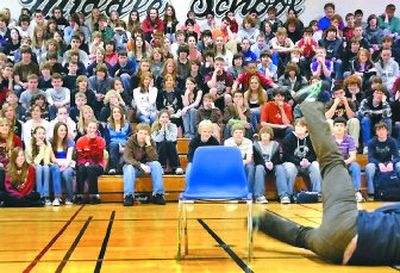College theater meets middle-schoolers

Eighth-graders get no respect. They’re too young to drive. They can’t vote. Most are in the throes of puberty, and five days a week, they dwell in the netherworld of middle school.
But two years ago, Whitworth theater professor Rick Hornor and Mead Middle School counselor Ed Mertz launched a collaborative process that gives eighth-grade students a voice.
Middle-school students are asked to write dramatic monologues in their English classes. The monologues are sent to Whitworth’s Acting I class, where college students each choose a selection to perform at a special school assembly.
Mead teacher Yukon Degenhart said he offers his students a wide variety of topics to choose from. “I share personal stories about myself to get them thinking,” he said. He talked with his class about his grandfather’s death as well as what it was like to compete on a state championship team. He encouraged the teens to write about special memories or current issues they struggle with.
Then the students are set free to tell their own stories. Honors English teacher Greta Keaton said it’s evident her students tell their stories from their hearts. “They’re writing anonymously, so there’s freedom in the expression.”
The teachers gathered 70 monologues this year and sent them to Brooke Kiener’s Whitworth acting class. “I whittled them down to 35 and then let my students go through them and choose which ones they’d like to perform,” she said.
Whitworth senior Denice Randle selected “Fire,” in which a student shares the memory of the time he and a friend set a field on fire trying to light bottle rockets.
“I think this is a great way to bridge the gap between middle school and college. It’s important for students to see their stories have an impact,” Randle said.
On March 20, the gymnasium at Mead Middle School was filled with the thumping, shouting and jostling of teens as they gathered for the Monologue Assembly. None of the students knew which monologues had been chosen. Neither did their teachers.
Under the yellow glare of fluorescent lights with a volleyball net as an unlikely backdrop, one by one each Whitworth student took the stage. The boisterous crowd fell silent, enthralled with seeing and hearing their own words come to life.
First up, Conor Wing set the tone as he related the memory of a familiar rite of passage. “In the hot summer of 1998,” he intoned, “my dad took the training wheels off my bike.”
Whitworth junior Lindsay Darbonne channeled her own middle-school years in a monologue titled “Being 14.” “It’s the worst age ever!” she wailed.
Kiener said her class enjoyed the process. Student Brian Stenberg agreed. “It’s fun helping someone here at the middle school tell their story.”
Amazingly, the college students held the attention of the younger XBox, iPod generation, using only a chair, their voices and the teens’ own words.
The eighth-graders whose monologues had been chosen were alternately thrilled and embarrassed even though their names weren’t mentioned with their stories. “It was really weird to hear your exact words coming from another person’s mouth,” said 14-year-old Rachel Guidice.
Degenhart, who attended Mead Middle School in the ‘80s, said, “Kids are still great, but they have so many more challenges today. They’ve lost some of their innocence.”
The importance of giving these teens a voice was emphasized by the silence that followed Kathleen Puhlman’s performance of “It’s my Turn.”
“When the teachers aren’t looking,” she said, “middle school turns into a whole different place as bullies emerge from the shadows.” She spoke of the pain of exclusion and the loneliness of being left out. “But it’s my turn now!” she said. “Life shouldn’t be spent living in the shadows.”
The gym was hushed and then a wave of applause and cheers rang out. It was the sound of eighth-graders who had found their voices.